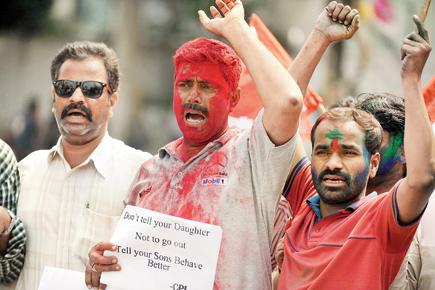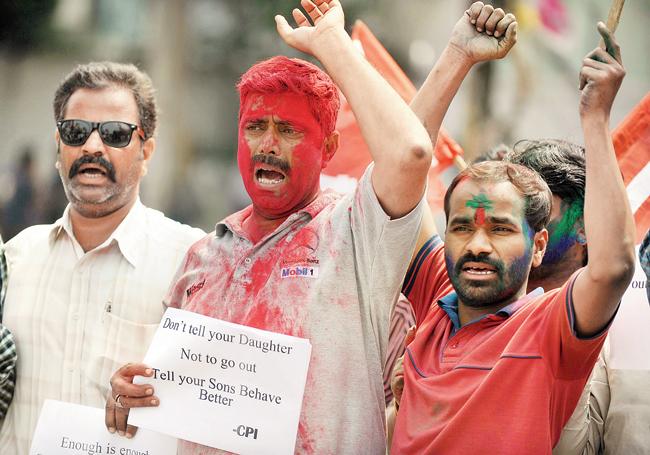Everyone has been talking about India’s Daughter, but not enough attention is being paid to India’s Son

It is important to go beyond mere outrage, and understand why Indian families create misogynists
 Everyone has been talking about India’s Daughter, but not enough attention is being paid to India’s Son. And why and how ordinary Indian families are raising sons who become rapists, molesters, abusers or misogynists — but this aspect is barely being acknowledged, let alone addressed.
Everyone has been talking about India’s Daughter, but not enough attention is being paid to India’s Son. And why and how ordinary Indian families are raising sons who become rapists, molesters, abusers or misogynists — but this aspect is barely being acknowledged, let alone addressed.
Indeed, a substantial number of Indian men are fairly Taliban, in terms of how they perceive and behave with women — women should be fully covered, they should not be allowed to study much, or go out to work, or walk freely in the streets except with a blood relative or husband — otherwise, women can be killed/executed for violating these codes.
ADVERTISEMENT

It is important to go beyond mere outrage, and understand why Indian families create misogynists. Pic/AFP
Of course, I felt a deep revulsion at the gang-rape and murder of Nirbhaya on December 16, 2012, as well as the statements made by an unrepentant Mukesh Singh, one of the men convicted of her rape and murder and sentenced to death by hanging (but currently on appeal), in Leslee Udwin’s documentary India’s Daughter. The film has been banned by a trial court until further orders. Singh said that the victim “had to be to be taught a lesson” for going out late with a boy; “when being raped, she should not fight back, she should quietly allow it,” and more.
The documentary must be made compulsory viewing, because it frankly holds a mirror, showing us what we really are like. The first step in resolving a problem is to acknowledge that it exists, and then address the causes. Hanging a handful of rapists will not prevent millions more taking their place tomorrow. So it is important to go beyond mere outrage, and understand why Indian families create misogynists. Obviously, it is a psycho-sociological issue of gender and patriarchy, but the deeper causes are economic—poverty, unemployment, and a lack of education and upbringing that gives both girls and boys a sense of self-worth, and teaches men to value women.
Mukesh Singh said “someone (the juvenile rapist) shoved his hand inside her and pulled out something long. It was her intestines.” What kind of family background and growing up environment must a child have had, to learn that it was OK to do this? Most of the rapists were desperately poor, growing up with deprivation, violence and injustice — when others seemed to be having a great time, with money, girls, the works — and seemed predisposed to violence. Of course, that is not an excuse — misogynist men come from all classes, nor are most Indian women, who are poor and brutalised, predisposed to violence — but it remains one of the underlying causes that needs to be addressed.
A slum-dweller and school dropout, Mukesh Singh ran away from his violent family when he was 11; his brother would give him electric shocks if he did something wrong. His mother, grieving that he is to be hung (his convict-brother Ram Singh was found dead in jail), said, “Isn’t this why everyone raises children? To look after us in our old age?”
In addition to the inconsolable grief of every mother who loses her son, hers was also the despair of one who has lost her pension plan too, in one stroke. Fellow death row convict Akshay Thakur’s wife Puneeta Devi, a poor villager, said, “I don’t want to live. I will strangle my son. What else to do?” Can you imagine the scars — and self-loathing — of a child who grows up knowing he/she is such a financial burden by being alive? This goes for millions of poor Indian children.
However, the issue is complex, because the misogyny is deep-rooted not only in Indian men, but in women themselves. There is a murky grey area between coercion and choice, say between Nirbhaya and the three Kanpur sisters who hung themselves from the ceiling in 1988, because they did not want to be a burden to their father, who could not afford their dowries.
Nirbhaya’s parents — her father is an airport loader — set a remarkable example by selling their land to educate their daughter, and tragically, their liberalism and sacrifice has gone in vain. Nonetheless, any long-term solution would have to include greater opportunities, incentives and support systems for education and jobs, especially for women. In fact, the 2015 Union budget has cut its education outlay by over 2 per cent.
ne small consolation, meanwhile: Hindi cinema’s Dum Laga Ke Haisha is sending out a powerful signal: a modest, RSS-entangled family valuing an overweight bride who is more educated than their son, because she is a service-wali bahu (working woman): true, they did it only to selfishly sponge off her, but fortunately, she holds her own.
Meenakshi Shedde is South Asia Consultant to the Berlin Film Festival, an award-winning critic, curator to festivals worldwide, and journalist. She can be reached at meenakshishedde@gmail.com.
The views expressed in this column are the individual’s and don’t represent those of the paper.
 Subscribe today by clicking the link and stay updated with the latest news!" Click here!
Subscribe today by clicking the link and stay updated with the latest news!" Click here!







